ASUS Prime Z590-A Intel Z590 (LGA1200) ATX motherboard, PCIe
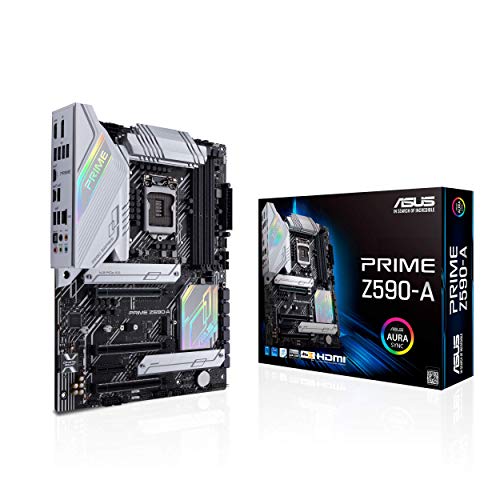
ASUS Prime Z590-A Intel Z590 (LGA1200) ATX motherboard, PCIe 4.0, x3 M.2, 16 DrMOS, DDR4 5333(OC), Intel 2.5 Gb LAN, HDMI, DisplayPort, USB3.2 Gen 2×2 and front Gen 1 Type-C, Thunderbolt 4 & Aura Sync
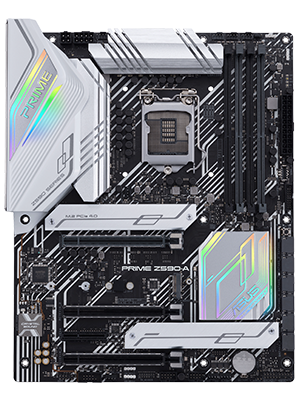

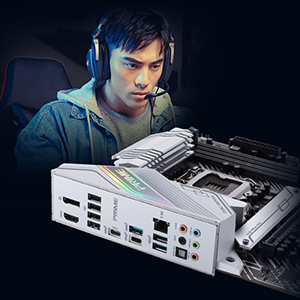
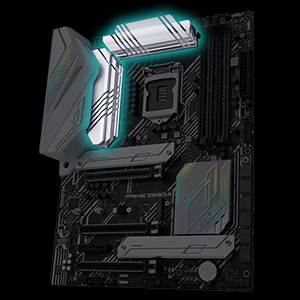
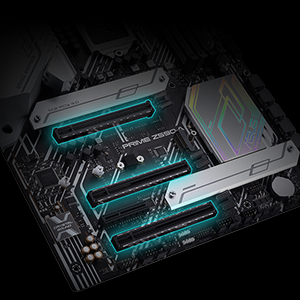
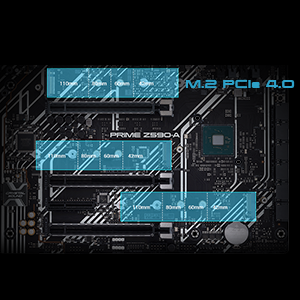
PCIe 4.0 Slot
ASUS Z590 motherboards are designed specifically for 11th Gen Intel Core CPUs, and offer PCIe 4.0 connectivity for the latest GPUs. The wide bandwidth and superfast transmission speeds allow you to create feature-rich builds that can handle high loads effortlessly.
USB 3.2 Gen 2×2 Type-C
Numerous USB ports support high-end rigs loaded with peripherals, including both front and rear USB Type-C connectors with fast USB 3.2 Gen 2×2 for transmission speeds of up to 20 Gbps.
Three M.2 slots (up to 64 Gbps)
Prime Z590-A offers a total of three M.2 slots, with one slot supporting data-transfer speeds of up to 64 Gbps via PCI Express 4.0, enabling quicker boot-up and app load times with OS or application drives.
| Weight: | 1 kg |
| Dimensions: | 30.5 x 24.5 x 6 cm; 1 Kilograms |
| Brand: | ASUS |
| Model: | PRIME Z590-A |
| Colour: | Colour of the Image |
| Batteries Included: | No |
| Manufacture: | ASUS |
| Dimensions: | 30.5 x 24.5 x 6 cm; 1 Kilograms |
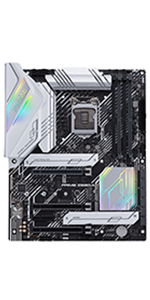
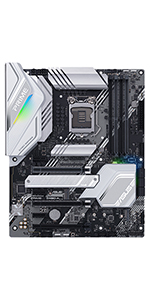
It has 3 NVMe slots, thankfully so that is a huge bonus.
But only 4x Sata cable slots, sadly.
Very fast and modern chip set.
I do not use the WiFi adapter because .. why would you!?
NOTE ;
If you’re upgrading from another ASUS board you don’t even need to re install OS! It ran through a few configs (automatically) then booted right up,
Very very impressed with these boards.
I have used MSI motherboards for the last few years for my PC builds, however, I switched to ASUS for this time.
I am really impressed with the BIOS settings available in this ASUS Prime Z790-P WIFI D4. They seem far more easy to use than my previous MSI boards. This means that you can tweak just about anything.
So far so good, the actual running of the board has been faultless so far.
Got this motherboard as part of my first pc build.
It looks great and was easy to set up and connect everything.
The book that comes along with it makes clear what connects into which location, and how to turn the computer on for the first time and navigate the bios menus.
Board was a bit warped and made it difficult to fit and line up with USB ports against the rear metal template. Screws were indicated by a diagram as being the thinner of the two available for attaching the motherboard but it turned out that it was the fatter of the two. This is my first build, so I don’t know if it is normal to have a warped board. I managed to get it to fit and it all works perfectly.
I bought this after returning a Gigabyte board that refused to post. This one posted at the first attempt. Lots of features including Intel 12th generation, DDR5 and WiFi6. Good instruction booklet made for a pain free install.
This is a great looking card and very easy to build on. The BIOS menu is easy to navigate and once built I love the LED touch to the motherboard. The one thing that lets it down is it only has 2xUSB2 headers, it does say in the user guide it will adapt to 4 so not sure why they didn’t put 4 on the PCB? Just had to buy a splitter so kind of annoying that I have to hide this away for cosmetic reasons. Overall a great bit of kit.
The first motherboard was an Amazon Warehouse as new purchase. I’ve had excellent deals from Amazon Warehouse in the past but this wasn’t one of them, and clearly a used faulty return. As I was running Microsoft Windows and Office, the change of Motherboard and CPU meant buying a new licence. The many hours spent trying to sort the first motherboard weren’t repeated with the second. The known error with the Intel ethernet adapter “appears” to have been fixed. The layout for cabling and access is improved when compared with the Ranger. However, the diagnostics are reduced to multi-coloured LEDs (I miss the Ranger Q-code alphanumeric readout), there are limited chassis fan headers, the chipset needs the retro-fitted fan (it runs at 50 C at normal speed). The ASUS description states that it supports [ASUS] Thunderbolt 3. However, my ASUS PCIe ThunderboltEX 3 card requires a 5 pin header but the motherboard has a 14 pin header, so my EX 3 card has to be replaced by a new 3-TR card that Amazon have just increased in price from 90 to 133!
A quirk that I haven’t come across before. The BIOS.cap file download identified by ASUS “Armoury Crate” has a different number than the BIOS. ASUS Support say that the BIOS shown in Armoury Crate is out of date!
It has the potential to be a good motherboard for the money, as it’s currently running air-cooled at 35% overclock, quiet and cool. The first motherboard appears to have been faulty and old stock (ASUS Support advised not covered by warranty). The ethernet adapter problem affects other manufacturers too. The first motherboard was returned to Amazon as it was the worst motherboard that I’ve installed. The replacement works well as of October 2021. There is a serious Intel CSME vulnerability, and whilst there is a detection download and a fix, they are not easy to find.
It’s cost more than 500 to update for Windows 11 and several days trying to sort the first motherboard. Our Surface Book laptop appears to be Windows 11 compliant. Windows 10, Android and unsupported Office 2010 or Libre Office will suit me just fine for the rest of my kit.
ASUS UK advise they no longer issue RMAs. The 3 or 5 year warranty for a motherboard is handled by the retailer by arrangement with the retailer. If the retailer doesn’t have an agreement with ASUS or it is bought from a private seller, there doesn’t appear to be a way of returning a faulty item. I had a VRM stage fail on a new ROG motherboard bought from a private seller; ASUS UK don’t want to know. Before buying an ASUS motherboard, check with a seller that they have an agreement with ASUS to handle the ASUS warranty for the stated number of years.
aye its been near 15 years since i bought a board, i got this and its a good job, has the m2 slot for the super fast drive so now pc boots up right away almost. im running an i9 with a beast of a fan so looks good. also has wee rgb lights which isnt a big thing to me but it flashes away.
anyway most important thing is it runs my microsoft flight sim 2020 nicely along with 32gig ram and the i9 processor.
bios is also good and easy enough to set up…. think my memory only ran at 1200mhz until i turned something on or off in the bios and now is runs at the 3600mhz as its supposed too.
This motherboard is great for gaming, normal use and perfect for beginner overclocking. I would say the performance and price would rival some of the ROG Motherboards. This has enough headers for great fan configurations to keep your system very cool. The RGB is very subtle but very tasteful. It can handle WiFi 6 card which is a bonus!
It comes with a M2 cooling shield, but would have loved for them to include 2 instead of 1 for each M2 slot.
Asus are known for their consistency on quality and performance, and what you get for the price you pay, definitely worth it!
ok about this motherboard. the good and the bad. ok it at the start. let’s start there. instructions to use it is easy and you can overclock if you need to or you can go straight to the bios and select your hard drive or USB stick. if you’re reads reinstalling windows. have a USB stick or thumb drive and install Windows onto it. you can plug it into your PC go to the windows website and install Windows onto your flash drive. the faster your flash drive is the faster Windows will install it will take at literally 8 to 10 minutes. that’s including typing into your CD key to activate it. it’s that fast. now the bad thing even if you have windows on your C drive or one of your hard drives it still won’t detect it. it took me 6 hours to figure out I had to reinstall Windows over my already working Windows drive. I have a separate hard drive Just for Windows SSD and other windows programs like soundcard and TeamSpeak and other things you need. but it’s still a pain when you have to reinstall everything at all over again. but reinstalling all your other operating systems making sure your websites recognise you and doing all your operation systems. is a real pain in the bottom. but if I knew I had to do it then I would have started a lot sooner. I had to plug in my old power supply old motherboard old RAM old monitor just so I can go onto internet. and go onto Google so I can figure out but to do. but they’re videos all show them automatically seen the operation system for windows to boot up from. so it didn’t help me. so be careful buying this motherboard it’s good but unless if you know you have to reinstall Windows you may not like it.
Picked up this motherboard for my new Intel Core i7-10700F (stock of the 5000-series Ryzen was driving me crazy). Very impressed with the quality of the motherboard, the solid big heatsinks, the support for 2 M.2 NVMe SSD sticks and a whole of options I think I’m never going to touch in the BIOS haha. It picked up my Corsair 16GB 3200MHz DDR4 RAM perfectly fine and it was really quick and easy to apply XMP from the EZ mode that ASUS puts you in when you enter the BIOS to get that fast speedy RAM speed. Socket 1200 was completely compatible with my 2-year old Corsair H60 cooler that I had used in my last i7-3770 build and I get very solid temps (never above 60 degrees in full load) in my Corsair 275R Airflow case. The only critique I would give the motherboard is that for the price, it would have been nice if there was a Type-C port on the back of the motherboard. I appreciate that there is USB Type-A 3.2 but I do have two USB-C devices so I do have to carry on using adapters but it’ll do. I’m no Linus Tech Tips or anything so I don’t know what else I should be looking out for but this motherboard really impresses me and looks beautiful in my white case and performs extremely well. Good purchase! I am hoping this motherboard will last many Intel generations to come knowing that Socket 1200 just began.
I bought this board with an 17 10th Gen processor and 64GB Ram, in the right hands this is a very stable board, with all the features of a more expensive Motherboard, first class performance.
I have read the reviews from various people on here, and half of it is waffle frankly, ok I have been building systems for over 20 years so maybe its easy for me to make a more defined judgement, and for sure i’m not here to criticise enthusiastic amateurs but the secret is to keep it simple and follow the correct build procedures and you cant go wrong….if you want some tips – Get a water cooler with these Motherboards/Processors and buy a big enough case with sufficient Fans, don’t use onboard graphics if offered, good speed memory, and test overclocking properly, this board will set your 10th Gen Processor speed to 5.0GHZ, manually adjust to 4.8GHZ and you are flying….use XMP2 for Memory Overclock, SSD Drives only, and with a proper understanding of Windows 10 install you are good to go.
Good Luck
The first motherboard refused to recognise RAM in the left sided DIMM slots. The replacement is fine. I like it a lot. The BIOS is great but it will be a steep learning curve. Be wary!! Don’t waste too much time if you get a similar problem. It’s happened to other users (search Tom’s Hardware and Z490 yellow light).
I have used MSI motherbaords for the last few years for my PC builds but MSI are annoying in that they do not like you using TVs as monitors and therefore trying to access the BIOS when your resolution is all screwed up when you don’t have a VGA port is impossible! So I went for Asus. This board in particular because of the ports it offered, the reviews I found were good and I needed a Hackintosh compatible one.
The first one I got, I had to send back. After installing it in the chassis and logging in to BIOS to change relevant settings (I do not do Overclocking so we are talking standard changes!), I rebooted and got a blank screen. No beeping alerts to suggest that there was anything wrong with the RAM or CPU but I was getting no life from it at all. It had to be returned and to be honest I half considered asking for a full refund to go for my second option of another MSI board (which despite their BIOS resolution issues have always been very good), but I got a replacement.
Replacement, is fine, running sweetly apart from I am now only 2 months in and already the HDMi port seems wobbly and sometimes disconnects itself blacking out the screen again so you have to be really careful when using the rear USB ports etc that you do not knock the HDMi cable. I am hoping that this will be the only issue and with care all will be good.
I am however really impressed with the BIOS settings available. They seem far more expansive than my previous MSI Gaming 3 Z97 board. This means that you can tweak just about anything. I like this freedom of choice and versatility.
So far so good and I like that there are 4 RAM slots as some Mini ATX boards only have 2.
Apart from the HDMi issue the actual running of the board has been faultless so far.
If you’re after a powerful but somewhat small system thus mATX format and 9th gen CPU (thus with hardware fixes for (current) vulnerabilities) and fast (4267Mbps+) memory then this is pretty cheap and nice board. For me it works great with 9700K and 3200 DDR4. Yes it goes higher but I have no current need.
But if you’re not going to use top-end CPU and high-speed memory (or overclock) I say save your money and get the cheaper H370M or B360M. There is also a Z370M/II but at pretty much the same cost as this one (why launch it now Asus?)
The good:
– 2x PCIe x16 length slots, but only one x16 (for dedicated GPU) and 2nd x4 for say 10Gbe LAN or more SSDs?
– 2x USB 10Gbe ports (aka 3.1 gen 2) thus only major change from Z370M, Z270M or Z170M
– 2x M.2 PCIe/NVMe ports x4 thus you can have 2x SSDs on the board! (only one supports SATA)
– 3x PWM FAN headers (+CPU) thus pretty good control of modern fans
– RGB header if you want to bling your case or fans (standard ones 12V RGB not directly addressable)
– Obviously unlocked overclocking due to Z390 chipset; and more VRMs for high-end CPUs like 9700/9900 otherwise perhaps go for cheaper H370M or B360M?
– Supports ME TPM thus you can use BitLocker in Windows 10/8.1. It works, but hardware crypto only with SATA SSDs not NVMe (see below)
The mediocre:
– No heatsinks for M.2 slots and you probably should get some as NVMe drives run hot. Don’t spend too much though.
– No DP port as per description but DVI? If you want to use built-in GPU best use HDMI.
– HDMI is naturally 1.4 not 2.0 thus at 4k (2160p) you’re limited to 30Hz (naturally no HDR either)! So if you wanted a HTPC system you’re going to need a dedicated GPU with HDMI 2.0/60Hz (I assume you want 4k support for such a system)
– No USB-C port anymore like the old Z170M or Z370M/II for some reason? Pity.
– No header for USB 3.1 Gen2 front case ports. Perhaps too much to ask on this level?
The bad:
– BIOS-based Asus Q-Installer installs itself as a Windows service you cannot disable in Windows and runs each start. But thankfully you can disable it in BIOS/Tools. Nice injection vector there.
– No Samsung NVMe SED SSD hardware crypto (e.g. 970, 960) support thus software BitLocker only. On the boot drive, secondary drives may work but it’s inconvenient. No plans to fix.
Asus BIOS is also easy to mod say if you wanted to add SLIC or other features but remember you need to extract the capsule. Asus seems reliable to me still have an old Z170M (thus older version of this) that works perfectly still.
Price-wise it does seem more expensive than the competition but then Asus has always been so; feature-wise it is OK but still “Prime” is not high-end like Strix/ROG but decent. Kind of middle of the road I’d say.
Additional features such as M.2 and NVME support with USB 3.1 is a nice touch but should be standard to be honest.
Overclocking wise, I am only using the RAM feature and getting 3200Mhz without issues with memory as such.
Overall good buy and so far no issues even with install.
Good quality board with no flex, and very solid when installing.
Would recommend ASUS as always.